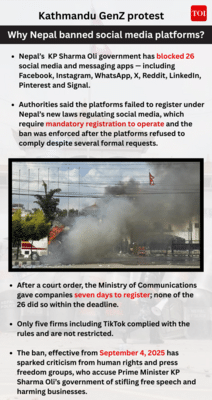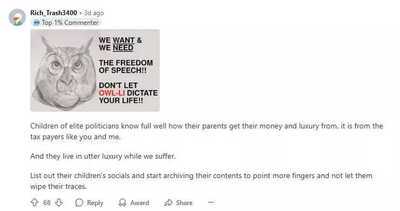Thousands of young protesters, under the banner of Generation Z, took to the streets of Kathmandu on Monday to oppose the Nepalese government’s ban on 26 social media platforms, including Facebook, Instagram, X, WhatsApp, and YouTube. At least 19 people were killed and hundreds were injured as clashes with police escalated outside the Parliament complex.
The violent protests are closely linked to the viral “Nepo Kid” campaign, which has spotlighted the children of politicians and influential figures, accusing them of enjoying lavish lifestyles - foreign education, luxury cars, and expensive holidays - funded by alleged corruption.

Videos and posts under hashtags like #PoliticiansNepoBabyNepal have highlighted the stark contrast between these privileged lives and the struggles of ordinary Nepalis, many of whom work abroad to make ends meet.
“Nepo Kids show off their lifestyle on Instagram and TikTok, but never explain where the money comes from,” one TikTok user had said in a widely shared video.

While initially an online movement on TikTok, Reddit, and other platforms, the campaign has now spilled onto the streets, with youths demanding accountability from political families alongside a repeal of the social media ban. Some critics, however, caution that targeting children for their parents’ actions risks cyberbullying.
The government justified the ban as a measure to enforce registration rules, but many see it as an attack on free speech and digital access. Protests turned violent when demonstrators entered the Parliament compound, prompting police to use baton charges, tear gas, and rubber bullets. The army has been deployed in several areas of Kathmandu, and curfews are in place to curb unrest.
The wave of demonstrations underscores a growing frustration among Nepal’s youth over entrenched political corruption, inequality, and digital restrictions, as Generation Z channels their discontent both online and in the streets.
The violent protests are closely linked to the viral “Nepo Kid” campaign, which has spotlighted the children of politicians and influential figures, accusing them of enjoying lavish lifestyles - foreign education, luxury cars, and expensive holidays - funded by alleged corruption.
Videos and posts under hashtags like #PoliticiansNepoBabyNepal have highlighted the stark contrast between these privileged lives and the struggles of ordinary Nepalis, many of whom work abroad to make ends meet.
“Nepo Kids show off their lifestyle on Instagram and TikTok, but never explain where the money comes from,” one TikTok user had said in a widely shared video.
While initially an online movement on TikTok, Reddit, and other platforms, the campaign has now spilled onto the streets, with youths demanding accountability from political families alongside a repeal of the social media ban. Some critics, however, caution that targeting children for their parents’ actions risks cyberbullying.
The government justified the ban as a measure to enforce registration rules, but many see it as an attack on free speech and digital access. Protests turned violent when demonstrators entered the Parliament compound, prompting police to use baton charges, tear gas, and rubber bullets. The army has been deployed in several areas of Kathmandu, and curfews are in place to curb unrest.
The wave of demonstrations underscores a growing frustration among Nepal’s youth over entrenched political corruption, inequality, and digital restrictions, as Generation Z channels their discontent both online and in the streets.
You may also like

Emergency crews rush to Speke factory after 'person falls 30ft into silo'

'Wonderful secret': Democrats release alleged 2003 Trump note to Epstein; written on outline of nude woman

'I was quoted 120k for home renovation but ended up spending £80k doing it myself'

Ukrainian president Zelenskyy sees US tariffs on India as 'right idea'

Mumbai-Indore Tejas Special Train Extended Again






